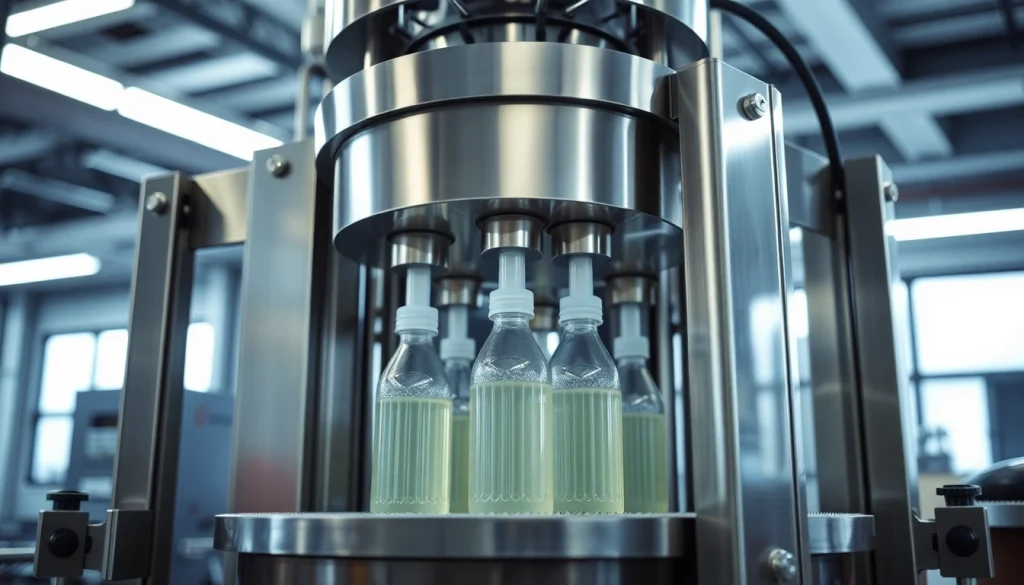Understanding Liquid Packaging Machines
Liquid packaging machines play a critical role in modern manufacturing processes, particularly in industries such as food and beverage, pharmaceuticals, and chemicals. These machines are designed to handle a variety of liquid products, ensuring they are efficiently packaged and preserved for distribution. Choosing a reliable Liquid Packaging Machine Supplier is essential for businesses looking to streamline their operations and maintain product integrity.
Types of Liquid Packaging Machines
Liquid packaging machines can be classified into several types based on their functionality and the nature of the products they handle. Understanding these types can help manufacturers select the appropriate machine for their specific needs.
- Filling Machines: These devices accurately dispense liquids into containers. They come in several formats, including piston fillers, gravity fillers, and pump fillers. Each type has advantages based on the viscosity and density of the liquid being packaged.
- Capping Machines: Job-based machinery that securely fastens caps onto containers. Capping machines can be automated or semi-automated, depending on production needs.
- Labeling Machines: These machines apply labels to filled containers, which is crucial for branding and providing product information to consumers.
- Cartoning and Wrapping Machines: After filling and capping, these machines typically package the products for shipment, either in cartons or wrapped for retail display.
- Complete Packaging Lines: Integrated systems that combine multiple functionalities – filling, capping, labeling, and cartoning – into a single, cohesive process.
The Importance of Quality in Packaging
Quality control in liquid packaging is paramount. Poor packaging can lead to contamination, spoilage, and product loss, ultimately affecting profitability and customer satisfaction. Key aspects to consider include:
- Material Compatibility: The packaging material must be compatible with the liquid to avoid reactions that could alter flavor, texture, or safety.
- Sealing Integrity: Proper sealing prevents microbial contamination and keeps the product fresh, which is crucial in sectors like food and beverage.
- Aesthetic Appeal: Besides preservation, attractive packaging can significantly influence consumer choice and brand loyalty.
Applications Across Industries
The versatility of liquid packaging machines allows their application across various industries:
- Food and Beverage: For products like juices, sauces, and dairy products, liquid packaging machines ensure freshness and safety.
- Pharmaceutical: These machines play a critical role in packaging medications where product integrity and accuracy are non-negotiable.
- Chemical Manufacturing: Packaging for cleaning agents, fertilizers, and other chemicals requires robust systems that can handle hazardous substances safely.
- Cosmetics and Personal Care: Packaging of serums, lotions, and other liquid products that need both functionality and aesthetic appeal.
Choosing the Right Liquid Packaging Machine
Selecting the appropriate liquid packaging machine involves careful consideration of various factors to align with manufacturing needs efficiently. Here are essential aspects to focus on:
Factors to Consider Before Buying
Before deciding on a liquid packaging machine, manufacturers should evaluate:
- Production Volume: Depending on whether the production needs are high or low, machines vary in speed and efficiency.
- Product Characteristics: The viscosity, temperature sensitivity, and particle size of the liquid can dictate the machinery type required.
- Budget: Determine not only the cost of the machine but also upkeep, maintenance, and potential productivity gains over time.
- Future Scalability: Choose machines that can adapt to increasing production needs without requiring complete replacement.
- Supplier Reputation: Consider the reliability, support, and maintenance services provided by the supplier.
Top Brands in the Market
When seeking liquid packaging solutions, various reputable brands lead the market. Noteworthy manufacturers include:
- Accutek Packaging Equipment: Known for their diverse range of filling equipment, Accutek provides options suitable for various container types.
- E-PAK Machinery: This company specializes in affordable, customizable liquid filling machines that offer optimal efficiency.
- Viking Masek: Offers innovative packaging solutions tailored specifically for liquid products, including both simple and complex machines.
- Filamatic: Well-regarded for versatile filling systems capable of managing a vast array of liquid products and containers.
Cost vs. Quality Analysis
The decision to invest in a liquid packaging machine often involves a trade-off between initial cost and long-term quality outcomes. It is essential to analyze:
- Initial Investment: High-quality machinery may come with a heftier price tag but often results in better reliability and lower maintenance costs.
- Operational Efficiency: The faster and more accurately a machine performs, the higher the throughput, which can significantly impact overall costs.
- Return on Investment (ROI): Calculate the potential revenue proffered from a higher quality machine against its purchase price to make a well-informed decision.
Maintenance and Efficiency
To ensure that packaging machines operate efficiently and have a long lifespan, proper maintenance is crucial. Consistent upkeep can stave off larger issues and reduce operational downtime.
Routine Maintenance Practices
Regular maintenance helps keep liquid packaging machines in peak condition. Routine tasks include:
- Cleaning: Ensuring the machine is free from residue and contaminants after each use prevents product issues and mechanical malfunctions.
- Lubrication: Regularly lubricating moving parts reduce wear and tear, leading to longer machine life and improved performance.
- Calibration: Periodic checks and adjustments guarantee that the machine operates within the specified tolerances for filling accuracy.
Maximizing Machine Lifespan
Besides routine maintenance, enhancing machine lifespan can be achieved through:
- Operator Training: Ensuring that operators are well-trained reduces the risk of misuse and extends the machine’s functional life.
- Annual Inspections: Scheduling comprehensive reviews of machine performance can identify issues before they become significant problems.
- Correct Usage: Using the machine within its specified parameters avoids strain that could lead to breakdowns.
Common Issues and Troubleshooting Tips
Even with good maintenance, issues can arise. Here are some common problems and their solutions:
- Inaccurate Fill Levels: Check calibration and ensure that no clogs are obstructing the filling nozzles.
- Leakage: Inspect seals and caps; a faulty sealing system can lead to waste and contamination.
- Mechanical Failures: If mechanical components fail, consult the maintenance manual for troubleshooting steps or reach out to the supplier for guidance.
Latest Innovations in Liquid Packaging
The liquid packaging industry is continually evolving with advancements in technology that enhance efficiency, sustainability, and product integrity.
Smart Technology Integration
Smart machines equipped with sensors and connectivity features are on the rise, enabling real-time data collection and monitoring. Benefits include:
- Predictive Maintenance: Utilizing data analytics to anticipate potential issues before they occur can drastically reduce downtime.
- Increased Efficiency: Technology can optimize production rates and ensure that every fill is consistent, reducing waste.
Eco-Friendly Packing Solutions
As the industry shifts toward sustainability, many liquid packaging machines now support eco-friendly materials and practices:
- Biodegradable Materials: Innovators are creating packaging options from plant-based materials that break down more easily than traditional plastics.
- Energy Efficiency: New machines are designed to consume less energy, thus reducing the operational carbon footprint.
Future Trends in Liquid Packaging
As technology and consumer preferences evolve, several trends are expected to shape the future of liquid packaging:
- Automation: Increased reliance on automated systems will improve throughput and cut labor costs, making liquid packaging more efficient.
- Customization: Machines that can rapidly switch between different products and fill sizes will cater to consumer demand for bespoke options.
- Blockchain Technology: Integrating blockchain will enhance transparency in the supply chain, according to food industry trends that favor traceability.
Working with a Reliable Supplier
Building a solid relationship with a liquid packaging machine supplier can lead to numerous advantages, from better pricing to enhanced operational support. Here’s how to develop that relationship:
Identifying Reputable Suppliers
Choosing the right supplier is critical. Consider the following steps in identifying a trustworthy liquid packaging machine supplier:
- Research and Reviews: Investigate the supplier’s reputation and customer reviews to assess their reliability and quality of service.
- Industry Experience: Opt for a supplier with a strong history in the liquid packaging industry, as they will have deeper expertise.
- Support and Training: Ensure they offer comprehensive trainings and robust customer support to aid in equipment use.
Building Long-Term Supplier Relationships
Once a supplier is identified, maintaining a strong relationship encourages better deals and tailored support:
- Regular Communication: Stay in touch to discuss needs, issues, and equipment performance openly.
- Fostering Trust: Establishing a reputation as a reliable customer can encourage suppliers to prioritize your needs and offers.
- Collaboration on Innovations: Engage with suppliers to seek out new technologies or upgrades that align with your current and future production goals.
Case Studies of Successful Implementations
Real-world examples of businesses that have successfully implemented liquid packaging solutions endorse the importance of thoughtful supplier selection:
One company in the beverage industry sought out a comprehensive solution that involved a combination of filling, capping, and labeling machinery. After consulting a leading liquid packaging machine supplier, they optimized their production line and significantly reduced waste, resulting in a 15% increase in operational efficiency. Furthermore, their focus on eco-friendly materials allowed them to present a sustainable image to consumers, positively impacting their brand value.
In the pharmaceutical sector, a business determined to streamline its operations partnered with an experienced supplier to incorporate automated filling lines. The result was a substantial increase in output while maintaining compliance with stringent regulatory standards.
Through these examples, it becomes evident that having a knowledgeable and supportive Liquid Packaging Machine Supplier can make all the difference in achieving operational goals and enhancing quality.


